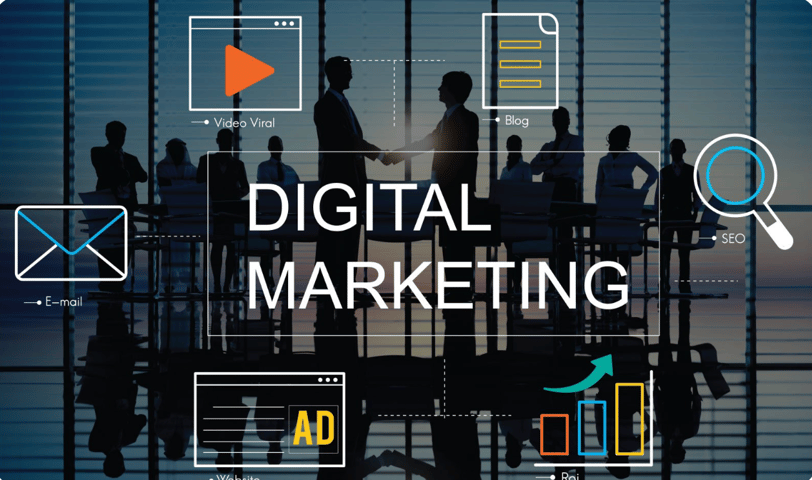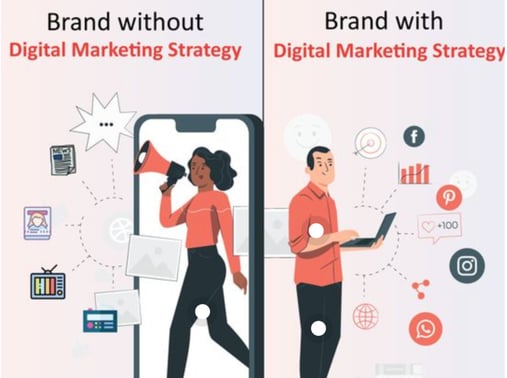Why Is Digital Marketing So Important to Businesses?
In a world where every scroll, click, and tap matters, businesses can't afford to ignore the power of digital marketing. 🌐💼 From boosting brand awareness to driving sales, the digital realm offers an expansive playground for businesses to thrive and connect with their audience. Dive into our latest blop post to uncover why digital marketing is the lifeline for modern businesses, exploring its pivotal role in shaping success, fostering engagement, and navigating the ever-evolving landscape of consumer behavior. Get ready to unlock the secrets to staying ahead in the digital race!
IT COMPANYDIGITAL MARKETINGINDUSTRY INSIGHTSBUSINESS GROWTH


My post content
What Is Digital Marketing?
Digital marketing is the use of digital channels or technologies to sell or promote a product or service. Content marketing, email marketing, pay-per-click (PPC) advertising, and SEO all fall under the umbrella of digital marketing. Put more simply: if you’re being nudged to buy something when you’re online, then that’s digital marketing at work.
Why Is Digital Marketing Important?
Digital marketing helps brands reach their target audience and promote their product or service. While that’s the goal of a traditional marketing campaign too, digital marketing allows brands to target a more specific or niche audience. Connecting with customers digitally helps build a wider audience that trusts your brand. It’s particularly useful for small businesses, which can easily leverage digital marketing tactics without the help of a marketing department or agency.


How Do Businesses Use Digital Marketing?
To understand how businesses use digital marketing, let’s use the example of Ryan—a fictitious mid-level salesman at a paper company. As a side hustle, he wants to open up a small business. He creates an app named “Woof!” which allows a person or company to simultaneously send an identical message across different mediums—text, email, Facebook, and so on.
Since Ryan has a small marketing budget, he will rely on systems and processes that have maximum reach with minimal investment. He will channel his resources towards awareness building. Value-filled content will be sufficient to propel his business. He might not have an in-house marketing department, so he will leverage social media through digital marketing agencies or freelancers who specialize in these areas. He might take on the social media marketing aspect himself.
Content marketing. Ryan can create written content—such as blogs and guides—about his product. He could also launch a YouTube channel featuring product demos. These kinds of content allow people to better understand the value of his product.
Search Engine Optimization (SEO). Ryan has all this content now, but it’s lost in the abyss of online searches. He looks at what his target customers are looking up online when searching for communication tools like his. So he uses these search terms as keywords to optimize his website, in the hopes of his content ranking higher.
Email marketing. Ryan then identifies a sizable list of prospective customers interested in buying his product. He creates an email list so that he can send information and resources related to his product.
Advertisements. Ryan has been relying on creating and repurposing content to build his pool of customers. He now wants to dip his toes in advertising, so he pays for ads to drive traffic to his website. This will require a budget to buy ad space for text, video, and image ads on websites or social media.
Social media marketing. Ryan has researched his audience and identified that they hang out on only one social channel, Instagram. So he creates an Instagram business profile to talk about his product without coming across as too “sales-y,” which helps him connect with his audience more intimately.
Influencer marketing. Ryan may use his influencer friends like Kelly, Pam, and Andy to promote his brand. Pam is a business communications consultant and is assisting her audience with using innovative communication tools. She recommends Ryan’s product to her followers, who flock to his website to buy the product using Pam’s referral code. Pam gets a commission.
Importance of Digital Marketing
The undeniable reach of digital mediums means that a business can access a large audience for its products and services. Compare the reach of an ad in a local newspaper versus a post on social media. That ad will only be limited to the newspaper’s subscribers, and for each day you run it, that’s money out of your marketing budget. The post can reach anyone on the platform, and you don’t pay for each day it’s on your profile.
Let’s use the example of fictitious Ryan to dive deeper into the importance of digital marketing:
Digitalization (Users/Customers Are Online)
With digital marketing, Ryan can access customers regardless of their location. He doesn’t need their phone numbers, addresses, or email IDs (until later in the funnel). All he needs to do is create his presence in spaces that his customers are in, such as on a particular social media platform or even search engines.
Targeted Audience Reach
Digital marketing will allow Ryan to target only those likely to buy his communication tools, i.e., his ideal customers. By posting high-quality content and studying who is visiting his website or engaging with his posts, he will get an insight into his target audience and tailor his ads towards them. Does he need to show his ads and posts to older people who prefer using the phone as the primary method of communication only? No. So he doesn’t need to include the older demographic.
How Much Will Digital Marketing Cost Your Business?
Digital marketing can cost anywhere between zero and thousands of dollars a month. It depends on the business, preferred marketing method, one’s marketing capabilities, marketing message, digital marketing tactics for connecting with the consumer, and the goals you want to achieve with digital marketing.
Small businesses will spend less, but even within small businesses, the niche, location, competition, and goals can vastly make the budgets differ. This graph breaks down the percentage of budget businesses allocated to different digital marketing forms across the UK, Germany, France, and North America:


